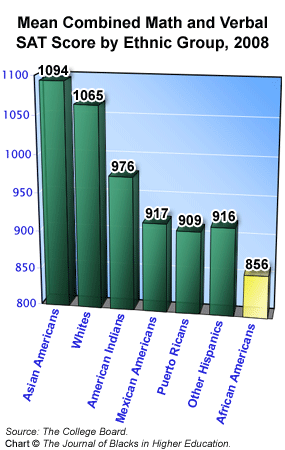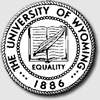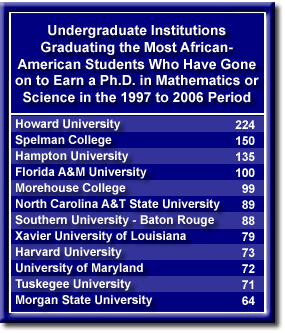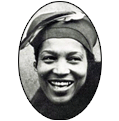On the SAT College Admission Test, African Americans Continue to Score Well Below Every Other Major Ethnic Group in the United States
In comparison to white scores, African-American scores on the SAT are at a 20-year low. But blacks also trail the scores of every other major ethnic group in the United States including students of Puerto Rican and Mexican backgrounds. In fact, few people realize that American Indian and Alaska Native students on average score 120 points, or 10 percent, higher than the average score of African-American students. Mexican-American students score 61 points, or 5 percent, higher than blacks. On average, Asian-American students score 238 points, or 20 percent, higher than African Americans.


UNIVERSITY OF SOUTH CAROLINA

Assistant or Associate Professor – Two Tenure Track Positions
Qualified candidates must have a Ph.D. in Retailing or a related field. The Department of Retailing is part of the College of Hospitality, Retail and Sport Management (HRSM). We offer the B.S. degree in Retailing (n=~400 majors), with specializations in either Retail Management or Fashion Merchandising. We also offer a Master of Retailing degree. HRSM is a leader in internationalizing the curriculum and study abroad opportunities. The University of South Carolina's main campus in the state capital is ranked by the Carnegie Foundation for the Advancement of Teaching as an institution of "very high research activity."
Responsibilities:
- Teach courses in one or more of the following areas: retail management, competitive retail strategies, international retailing with possibility of becoming graduate director.
- Produce scholarly research and generate grants. Demonstrate leadership.
- Provide service to the department, college, and university.
Qualifications:
- Ph.D. in Retailing, Merchandising, Business or a related field.
- Demonstration of ability to generate scholarly work commensurate with rank.
- The candidate accepted for the position must be able to meet eligibility requirements for work in the United States and communicate effectively in English.
Review Dates: Review of applications will begin October 6, 2008, and continue until the position is filled
Send letter of application including curriculum vitae; official transcripts from all universities attended; three letters of reference sent under separate cover to:
Richard Clodfelter, Ed.D.
Interim Associate Dean of Academics
HRSM
University of South Carolina
Columbia, SC 29208
clodfelt@mailbox.sc.edu
The University of South Carolina is an affirmative action, equal opportunity employer. Minorities and women are encouraged to apply. The University of South Carolina is responsive to the needs of dual career couples.

Morehouse College Receives Donation of 109 Purvis Young Paintings
 Morehouse College, the historically black educational institution for men in Atlanta, received a donation of 109 paintings by folk artist Purvis Young. The donation, valued at $1 million, was from the Rubell Family Collection. In 2000 the Rubell family bought all the works painted by Young during the 1985 to 1999 period. The collection is the largest donation of art ever made to Morehouse College. Morehouse College, the historically black educational institution for men in Atlanta, received a donation of 109 paintings by folk artist Purvis Young. The donation, valued at $1 million, was from the Rubell Family Collection. In 2000 the Rubell family bought all the works painted by Young during the 1985 to 1999 period. The collection is the largest donation of art ever made to Morehouse College.
Young, who lives in the Overtown neighborhood of Miami, uses items he finds on the street in his works which deal with issues of the inner city.
University of Chicago Study Shows Racial Differences in Abuse of the Elderly
 A new study by researchers at the University of Chicago finds that 13 percent of elderly Americans suffer from mistreatment or abuse. The study, published in the Journal of Gerontology: Social Sciences, found no racial differences in rates of physical or verbal abuse of the elderly. A new study by researchers at the University of Chicago finds that 13 percent of elderly Americans suffer from mistreatment or abuse. The study, published in the Journal of Gerontology: Social Sciences, found no racial differences in rates of physical or verbal abuse of the elderly.
However, there was a huge racial disparity between whites and blacks on financial mistreatment. Respondents to the survey were asked, “Is there anyone who has taken your money or belongings without your permission or prevented you from getting them?” The results showed that African-American elderly were 77 percent more likely than older white Americans to be taken advantage of by family members in terms of their financial matters.
The African Partner of South Carolina State University
 In a program funded by the U.S. Agency for International Development, South Carolina State University, the historically black educational institution in Orangeburg, recently transferred 684,000 textbooks to the people of Zanzibar in Africa. The textbooks, developed by faculty at South Carolina State, will be used in high school chemistry and mathematics classes. It is the first time in history that every high school student in the country will have a textbook. In a program funded by the U.S. Agency for International Development, South Carolina State University, the historically black educational institution in Orangeburg, recently transferred 684,000 textbooks to the people of Zanzibar in Africa. The textbooks, developed by faculty at South Carolina State, will be used in high school chemistry and mathematics classes. It is the first time in history that every high school student in the country will have a textbook.
The government of Zanzibar will provide scholarships for students to study abroad and a faculty member will be sent to Orangeburg to teach the Kiswahili language.
In the next phase of the project South Carolina State University will work to produce textbooks for students in lower grades.

UNIVERSITY OF WYOMING

Wyoming Excellence in Higher Education Endowed Chair in Literacy Education
Qualifications: We seek an established academic with an earned doctorate in literacy education or related field. Applicants should have a well-established record of research and scholarship commensurate with the rank of advanced associate or full professor, demonstrated excellence in teaching and advising graduate students, and a history of extramural funding. A candidate’s research agenda should be relevant to literacy education and include expertise in one or more of the following areas:
• Literacy education for English learners or culturally diverse students
• Emergent literacy, family literacy, or early childhood literacy education
• Adolescent literacy
• Evaluation and instruction of students with reading difficulties or special needs
Responsibilities: The endowed chair in literacy will be expected to:
• continue with an active scholarly line of inquiry and publication;
• seek extramural funding
• recruit and advise graduate students
• teach courses in the candidate’s areas of expertise on campus and across Wyoming through the UW Outreach School;
• provide leadership and work collaboratively with interdisciplinary teams to establish a nationally recognized program in literacy education; and
• interact with faculty and departments across the UW campus and with professionals in public schools.
Application procedures: Applicants should submit the following materials electronically to Ms. Debra Dobbyn (ddobbyn@uwyo.edu): (a) a letter of application detailing the candidate’s qualifications for the position; (b) a complete curriculum vita; and (c) three publications that reflect the candidate’s research and applied scholarship.

Black Colleges and Universities Are Graduating an Increasing Share of African Americans Who Earn Ph.D.s in Mathematics and Science
The nation’s historically black colleges and universities produce about one of every six African-American students who earn a bachelor’s degree in the United States. Thirty years ago, black colleges produced about a third of all African Americans who earned bachelor’s degrees. This decline is not because black colleges are turning out fewer graduates but because predominantly white institutions are now enrolling and graduating far greater numbers of black students.
But in one important area the black colleges are having a greater impact than before. A new report from the National Science Foundation finds that black colleges and universities are producing a greater share of graduates who go on to earn Ph.D.s in science and engineering than was the case in the past. In 1990, of all blacks who earned Ph.D.s in the fields of mathematics or science, 21 percent were graduates of historically black colleges and universities. In 2006, the latest year for which data is available, black colleges were the feeder schools for 29 percent of African Americans who earned doctorates in these fields.
The eight colleges and universities that produced the most African-American graduates who went on to earn Ph.D.s. in mathematics or science in the 1997 to 2006 period are all historically black colleges and universities. Harvard University ranked ninth and the University of Maryland was tenth.

Black Head Coaches Are Still Scarce in Major College Football
This season there are six black head coaches at the 120 colleges and universities that play in the National Collegiate Athletic Association’s Division I-A. These major football programs are the schools that compete for spots in lucrative bowl games. A decade ago, there were eight black head coaches in major college football. African-American athletes make up about 55 percent of all football players in the NCAA’s Division I-A.
 The six black head coaches are Kevin Sumlin at the University of Houston, Sylvester Croom at Mississippi State University, Turner Gill at the University of Buffalo, Ron Prince at Kansas State University, Randy Shannon at the University of Miami, and Tyrone Willingham at the University of Washington. The six black head coaches are Kevin Sumlin at the University of Houston, Sylvester Croom at Mississippi State University, Turner Gill at the University of Buffalo, Ron Prince at Kansas State University, Randy Shannon at the University of Miami, and Tyrone Willingham at the University of Washington.

WAYNE STATE UNIVERSITY

Tenure-Track Assistant Professor,
Cognitive Psychology
WAYNE STATE UNIVERSITY, DEPARTMENT OF PSYCHOLOGY invites applications for a tenure-track position (we expect the position to be at the assistant professor level but it is open to exceptional senior applicants) in our Cognitive Psychology Program. This appointment requires a Ph.D. degree with formal training in cognitive psychology and is to become effective (position(s) subject to administrative approval) in late August, 2009. Interdisciplinary overlap with one of the other research and training emphases (e.g., behavioral and cognitive neuroscience, clinical, developmental, social) in the department will also be viewed positively. Successful applicants are expected to maintain or establish a funded research program. Normal teaching load is two courses per semester and involves both undergraduate and graduate instruction. The university is located in a very large metropolitan area with a rich cultural life. This position is contingent upon final approval by the University. For information on the Department of Psychology, see our website at: http://www.clas.wayne.edu/Psychology/
Review of completed applications will begin immediately and continue until the position has been filled. All applicants should send statements describing their undergraduate and graduate teaching interests and their research interests and plans. The letter as well as a curriculum vitae, copies of publications or other relevant information, and three letters of reference should be sent to: Douglas Whitman, Ph.D., Chair, Department of Psychology, 5057 Woodard Avenue, 7th Floor, Wayne State University, Detroit, MI 48202. Contact dwhitman@wayne.edu, or Karen Schramm (kschramm@wayne.edu, 313-577-2802) for further information.
Wayne State is a Carnegie Research Intensive University and offers more than 350 undergraduate and graduate academic programs through 10 schools and colleges to more than 34,000 students in Metropolitan Detroit. WSU is an equal opportunity/affirmative action employer.

Appointments
 • Cynthia M.A. Butler-Mcintyre was elected president of the Delta Sigma Theta sorority, which was founded in 1913 on the campus of Howard University. A native of New Orleans, she is an administrator for the Jefferson Parish public school system. • Cynthia M.A. Butler-Mcintyre was elected president of the Delta Sigma Theta sorority, which was founded in 1913 on the campus of Howard University. A native of New Orleans, she is an administrator for the Jefferson Parish public school system.
Butler-McIntyre is a graduate of Dillard University and holds a master’s degree from the University of New Orleans.
 • Antwan Jones, a doctoral candidate in sociology, was named graduate student trustee at Bowling Green State University in Ohio. A graduate of Duke University, he holds a master’s degree in sociology from Bowling Green State University. • Antwan Jones, a doctoral candidate in sociology, was named graduate student trustee at Bowling Green State University in Ohio. A graduate of Duke University, he holds a master’s degree in sociology from Bowling Green State University.
 • Johnetta Cross Brazzell, vice chancellor for student affairs at the University of Arkansas, has announced her retirement effective January 31, 2009. Before coming to the university in 1999, she was vice president for student affairs at her alma mater, Spelman College. • Johnetta Cross Brazzell, vice chancellor for student affairs at the University of Arkansas, has announced her retirement effective January 31, 2009. Before coming to the university in 1999, she was vice president for student affairs at her alma mater, Spelman College.
Dr. Brazzell holds a master’s degree in history from the University of Chicago and a doctorate from the University of Michigan.
• Barbara Howard was named vice president of academic affairs at Lake-Sumter Community College in Leesburg, Florida. She was special assistant to the chancellor of the Virginia Community System.
Dr. Howard holds bachelor’s and master’s degrees from North Carolina Central University and a doctorate from the University of Maryland.
 • Deborah J. Callaway was promoted to special assistant to the chancellor at North Carolina A&T State University in Greensboro. She has been a member of the faculty and an administrator at the university since 1985. • Deborah J. Callaway was promoted to special assistant to the chancellor at North Carolina A&T State University in Greensboro. She has been a member of the faculty and an administrator at the university since 1985.
Dr. Callaway is a graduate of Virginia State University. She holds a master’s degree in education from Virginia Commonwealth University and an educational doctorate from Virginia Tech.
 • Kenneth Anderson was promoted to dean of humanities and social sciences at Calhoun Community College in Decatur, Alabama. He previously served as social sciences division chair and a psychology instructor at the school. • Kenneth Anderson was promoted to dean of humanities and social sciences at Calhoun Community College in Decatur, Alabama. He previously served as social sciences division chair and a psychology instructor at the school.
• Ulisa Bowles was named director of admissions at Fayetteville State University in North Carolina. Previously she was director of admissions at Bennett College for Women in Greensboro.
Bowles is a graduate of James Madison University. She holds a master’s degree in public administration from Clark Atlanta University.
|
Harvard Investigating Allegations of Racial Profiling by its University Police Force
 Harvard University is conducting an investigation into allegations of racial profiling against the university’s police force. Harvard University is conducting an investigation into allegations of racial profiling against the university’s police force.
The department has been criticized in the past for abusive treatment of black students and faculty on campus. For example, in 2004, S. Allen Counter, a neuroscience professor at Harvard, was stopped by police because they mistook him for a robbery suspect. This summer a black high school student who worked for Harvard had broken the key to his bicycle lock and was using a tool to cut the lock when Harvard police accused him of trying to steal the bike. One officer is accused of pointing a gun at the student and the other is alleged to have berated the student with profanity. The two police officers who were involved in the incident were placed on leave.
Harvard President Drew Gilpin Faust has appointed a six-member committee to investigate the charges. The committee will investigate the department’s diversity training, community outreach programs, and minority recruitment efforts.
  |
 “Republicans should apologize for how their leaders have shamelessly lied to the American people, allowed troops to commit unspeakable acts abroad, turned deaf ears and blind eyes to suffering, trampled civil liberties and civil rights, ignored cries of the poor, serviced the rich, exploited immigrants, all while falsely claiming authority as the party of God.” “Republicans should apologize for how their leaders have shamelessly lied to the American people, allowed troops to commit unspeakable acts abroad, turned deaf ears and blind eyes to suffering, trampled civil liberties and civil rights, ignored cries of the poor, serviced the rich, exploited immigrants, all while falsely claiming authority as the party of God.”
— Carol Swain, professor of law, Vanderbilt University
|
New Study Refutes the Ridiculous Theory That a Ban on Affirmative Action Would Actually Increase the Number of Black Lawyers
 In 2004 Richard H. Sander, a professor of law at UCLA, penned a highly controversial article that appeared in the Stanford Law Review. Sander presented data which he claimed showed that because of affirmative action, black students were being admitted to high-ranked law schools where they were incapable of competing with white students. Professor Sander published the startling conclusion that the nation would actually produce more black lawyers if affirmative action was abandoned. He explained that under a race-neutral admissions environment, black law students would gain admission only to law schools where they would succeed and go on to graduate and pass the bar exam. In 2004 Richard H. Sander, a professor of law at UCLA, penned a highly controversial article that appeared in the Stanford Law Review. Sander presented data which he claimed showed that because of affirmative action, black students were being admitted to high-ranked law schools where they were incapable of competing with white students. Professor Sander published the startling conclusion that the nation would actually produce more black lawyers if affirmative action was abandoned. He explained that under a race-neutral admissions environment, black law students would gain admission only to law schools where they would succeed and go on to graduate and pass the bar exam.
The Sander research became the Bible for racists and racial conservatives who had been fighting for years to keep black law students in second- or third-tier universities and thus make more places for whites in the top schools. It also provided fodder for those who were opposed to any form of affirmative action.
At the time, JBHE charged racial slander. It refuted the Sander thesis, showing that the black student graduation rate at the nation’s top law schools was very high, and in most cases was very near, if not equal to, the rate for white students.
Now a new study by Jesse Rothstein, an economist at Princeton University, and Albert H. Yoon, a professor of law at the University of Toronto, pokes further holes in the Sander thesis. Rothstein and Yoon’s analysis, using the same data set used by Sander, suggests that if there was no affirmative action in law school admissions, black students would not simply apply to lower-tier schools, they would not apply to law school at all.
The authors note that all law schools in the country have competitive admissions, not just the top-tier institutions. They conclude that if race-sensitive admissions were abolished at all law schools, black enrollments would drop from the current 8 percent to about 3.1 percent. At the nation’s elite law schools, the black percentage of total enrollments would drop from 8.7 percent to under 1 percent.
In a related development, Professor Sander has filed a lawsuit in California Supreme Court calling for the state to release data on how well law school graduates of different races perform on the state’s bar examination. Sander argues that the data would show whether black students admitted to law school under affirmative action admissions actually go on to pass the bar exam.

UNIVERSITY OF SOUTH CAROLINA

Assistant, Associate or Full Professor – One Tenure Track Position
Qualified candidates must have a Ph.D. in Retailing or a related field. The Department of Retailing is part of the College of Hospitality, Retail and Sport Management (HRSM). We offer the B.S. degree in Retailing (n=~400 majors), with specializations in either Retail Management or Fashion Merchandising. We also offer a Master of Retailing degree. HRSM is a leader in internationalizing the curriculum and study abroad opportunities. The University of South Carolina's main campus in the state capital is ranked by the Carnegie Foundation for the Advancement of Teaching as an institution of "very high research activity."
Responsibilities:
- Teach courses in one or more of the following areas: retail management and fashion merchandising.
- Produce scholarly research and generate grants. Demonstrate appropriate leadership skills at the incoming rank
- Provide service to the department, college, and university.
Qualifications:
- Ph.D. in Retailing, Merchandising or a related field.
- Demonstration of ability to generate scholarly work commensurate with rank.
- The candidate accepted for the position must be able to meet eligibility requirements for work in the United States and be able to communicate effectively in English.
Review Dates: Review of applications will begin October 6, 2008, and continue until the position is filled
Send letter of application including curriculum vitae; official transcripts from all universities attended; three letters of reference sent under separate cover to:
Richard Clodfelter, Ed.D.
Interim Associate Dean of Academics
College of Hospitality, Retail and Sport Management
University of South Carolina
Columbia, SC 29208
clodfelt@mailbox.sc.edu
The University of South Carolina is an affirmative action, equal opportunity employer. Minorities and women are encouraged to apply. The University of South Carolina is responsive to the needs of dual career couples.

New Scholarship Program for Minority Medical Students in Arkansas
 The University of Arkansas for Medical Sciences has announced the establishment of full-tuition scholarships for minority students. The scholarships will be available to all underrepresented minority students with “financial need and outstanding character and scholarship.” The University of Arkansas for Medical Sciences has announced the establishment of full-tuition scholarships for minority students. The scholarships will be available to all underrepresented minority students with “financial need and outstanding character and scholarship.”
The new scholarship program will be named to honor Dr. Raymond Phillip Miller, who was the first black member of the University of Arkansas board of trustees. Dr. Miller, one of 14 children, was a graduate of the University of Arkansas at Pine Bluff. He earned his medical degree at UAMS. He died in 2006 from cancer at the age of 69.
Assessing Progress in Racial Diversity at the University of Wisconsin
 A decade ago the University of Wisconsin adopted a 10-year plan to enhance racial diversity on its campuses. Dubbed Plan 2008, the goal was to increase black and other minority student enrollments and to increase the racial diversity of its faculty. A decade ago the University of Wisconsin adopted a 10-year plan to enhance racial diversity on its campuses. Dubbed Plan 2008, the goal was to increase black and other minority student enrollments and to increase the racial diversity of its faculty.
The percentage of minority students at the flagship Madison campus has increased from 9 percent to 12 percent over the past decade. However, half of the minority group is Asian. Blacks and Hispanics each make up only 3 percent of the student body.
The black student graduation rate at the University of Wisconsin is only 57 percent, more than 20 percentage points below the rate for whites.
Minorities now make up 16 percent of the total faculty, up from 10 percent a decade ago.
The university, with a new chancellor, now has to decide where to go from here.
Record Black Enrollments at the University of Missouri
 The University of Missouri at Columbia reports that freshman enrollments of 5,812 are up 15.6 percent from a year ago. Black enrollments increased at an even greater rate of 27.5 percent. The number of black freshmen on campus is the highest in university history. The University of Missouri at Columbia reports that freshman enrollments of 5,812 are up 15.6 percent from a year ago. Black enrollments increased at an even greater rate of 27.5 percent. The number of black freshmen on campus is the highest in university history.
Over the Past Decade, Proposition 209 Has Produced a Cutback in Faculty Hirings of Blacks in the University of California System
 Much has been written in this journal and in the press generally about the devastating impact Proposition 209 has had on black enrollments at the University of California at Berkeley and the University of California at Los Angeles. Now, more than a decade since the ban on affirmative action in admissions went into effect, black enrollments are barely half the level that existed when race could be considered in the admissions process. This fall, blacks make up 3.8 percent of the entering class at Berkeley and 4.8 percent at UCLA. Much has been written in this journal and in the press generally about the devastating impact Proposition 209 has had on black enrollments at the University of California at Berkeley and the University of California at Los Angeles. Now, more than a decade since the ban on affirmative action in admissions went into effect, black enrollments are barely half the level that existed when race could be considered in the admissions process. This fall, blacks make up 3.8 percent of the entering class at Berkeley and 4.8 percent at UCLA.
But little attention has been paid to Proposition 209’s impact on faculty hiring at the University of California. Under the public initiative approved by voters in 1996, hiring decisions at the University of California must be made without consideration of race.
In 1996 there were 186 black faculty members in tenure or tenure-track positions at all campuses of the University of California system. They made up 2.7 percent of all faculty. By 2007 the number of black faculty had climbed to 210, a 12.9 percent increase. But overall faculty had increased by 25 percent during the period. In 2007 blacks were only 2.4 percent of all ladder faculty at the University of California. So Proposition 209 does seem to have had a negative effect on the hiring of faculty who are black.

WAYNE STATE UNIVERSITY

Tenure-Track Position in Social Psychology
WAYNE STATE UNIVERSITY, DEPARTMENT OF PSYCHOLOGY invites applications for a tenure-track position (we expect the position to be at the assistant professor level but it is open to exceptional senior applicants) in Social Psychology. The appointment requires a Ph.D. degree with formal training in social psychology and is effective (position(s) subject to administrative approval) in late August, 2009. Area of expertise within social psychology is open, although candidates whose interests complement the university's urban mission and existing strengths in our department will be particularly attractive. All applicants are expected to have active, fundable research programs and to contribute to graduate and undergraduate education. For information about the Department of Psychology, see our website at: http://www.clas.wayne.edu/Psychology/.
Review of completed applications will begin October 15 and continue until the position has been filled. All applicants should submit a letter of interest, curriculum vitae, research and teaching statements, copies of publications or preprints, and arrange for three letters of reference to be sent to: Douglas Whitman, Ph.D., Chair, Department of Psychology, 5057 Woodward Avenue, 7th Floor, Wayne State University, Detroit, MI 48202. Contact dwhitman@wayne.edu, or Karen Schramm (kschramm@wayne.edu, 313-577-2802) for further information.
Wayne State is a Carnegie Intensive Research University and offers more than 350 undergraduate and graduate academic programs through 10 schools and colleges to more than 34,000 students. The university is located in a large metropolitan area with a rich cultural life. WSU is an equal opportunity/affirmative action employer.

Videoclip Shot by Zora Neale Hurston Features Her Singing “Uncle Bud”
 Readers may be interested to see a newly rediscovered clip of a 1939 film made by Zora Neale Hurston during one of her many trips throughout the rural South. The audio includes Hurston singing the “jook” song “Uncle Bud.” Readers may be interested to see a newly rediscovered clip of a 1939 film made by Zora Neale Hurston during one of her many trips throughout the rural South. The audio includes Hurston singing the “jook” song “Uncle Bud.”
To view the video click here.
In Memoriam
Charles F. Whitten (1922-2008)
 Charles F. Whitten, a physician, researcher, professor, and retired dean at the Wayne State University School of Medicine, died last month at his home in Detroit. He was 86 years old. Charles F. Whitten, a physician, researcher, professor, and retired dean at the Wayne State University School of Medicine, died last month at his home in Detroit. He was 86 years old.
Dr. Whitten was known for his pioneering work in sickle cell disease. But perhaps his greatest accomplishment was the development of programs to increase the number of black students seeking careers in medicine. In 1960 Whitten was a cofounder of the African Medical Education Fund. For 25 years this organization provided tuition for black medical school students in return for a pledge to practice medicine in Africa.
Dr. Whitten also started the Wayne State University postbaccalaureate program for black and other minority students who had applied but were not accepted to medical school. The program provided a year of remedial education and enrichment programs. Those students who successfully completed the program were admitted to the Wayne State University medical school. More than 300 African-American students entered this innovative program and went on to become physicians.
Dr. Whitten was born in Wilmington, Delaware, in 1922. At the age of 20 he received a bachelor’s degree at the University of Pennsylvania. Three years later he completed his medical training at Meharry Medical College. He joined the faculty of Wayne State University in 1957. He also served as chief of pediatrics at Detroit Receiving Hospital.
  |
71% Percentage of all white parents in 2007 who reported that their local school provided information on helping their children plan for college.
63% Percentage of all African-American parents in 2007 who reported that their local school provided information on helping their children plan for college.
source: U.S. Department of Education
|
Honors and Awards
 • Jerry M. Williams, who is retiring after more than a quarter-century at Virginia Tech, was honored with the title of associate professor emeritus. The title is reserved for faculty members who “have given exemplary service to the university.” • Jerry M. Williams, who is retiring after more than a quarter-century at Virginia Tech, was honored with the title of associate professor emeritus. The title is reserved for faculty members who “have given exemplary service to the university.”
Williams, who was an associate professor of horticulture, is a graduate of Morgan State University. He holds a master’s degree from Howard University and a Ph.D. from the University of Maryland.
• Percy A. Pierre received the Rev. John J. Cavanaugh Award from the University of Notre Dame Alumni Association. Pierre earned a master’s degree from Notre Dame and went on to earn a Ph.D. in electrical engineering from Johns Hopkins University. He served as assistant secretary for research for the U.S. Department of the Army in the Carter administration. He later was president of Prairie View A&M University.
Grants
• Fayetteville State University, the historically black educational institution in North Carolina, received grants from the United Way of Cumberland County and Target Stores for its Community Approach to Reading Effectiveness (CARE) program. The program involves rotating books among community centers in areas surrounding the campus in order to foster reading among young children.
• Hampton University, the historically black educational institution in Virginia, received a $490,000 grant from the Virginia Center for Innovative Technology’s Commonwealth Technology Research Fund. The grant will be shared with Eastern Virginia Medical School to develop a biologically optimized treatment planning system for proton radiotherapy cancer treatment.
|
 .
.